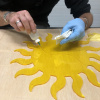This is the final post about our high altitude balloon project. Or is it? Maybe someone will find our balloon (pretty please?). If you happen across a box of crazy looking electronics with things like 'Load Control' and 'Every Sensor We Know' written on the boards, please email us!
For the final installment of this saga, we add three more tutorials for your perusal. In the graph above, you can see how the Enclosure and Heating System were affected during one of many freezer tests. It turns out we didn't even need a heater!
In the Weights, Measures, and Costs tutorial, we break down the specific weight and cost of all the items involved. The summary is that it was surprisingly light (less than 600 grams!) and painfully expensive to lose (nearly $800 in that little box).
And in the final tutorial, we cover Lessons Learned so that you can avoid some of the pitfalls that we ran across. If we had it to do all over again, these are the things we would have changed.










USE a Trackuino!
:)
High Altitude Ballooning Forum
Thought you guys and gals might be interested in this if you haven't seen it already. A family sent up a balloon and had some great footage to share. Amazing that the tech is becoming affordable and accessible for pretty much anyone to do this. Check it out pretty cool!
http://vimeo.com/15091562
Looks like I lost my balloon at about the same time you guys did...and not too far away from you either. It's surprisingly harder than it looks to keep track of them. If I launch another balloon I would do everything the same, except I would add in an XTend zigbee radio. My best guess was that my balloon reached an altitude above cellphone range and then drifted to an area where there was no coverage when it landed. The long range zigbee radio would solve that issue. You can check out my partial success at nearspaceballoon.blogspot.com. I used a lot of Sparkfun parts in my build. Thanks for great parts and prices!
I am slightly confused about this.
Being Sparkfun themselves I really didnt expect it to be lost, I mean this is Sparkfun employees. You guys build things so cool it makes my geeky eyes water and you lost a giant balloon :S
Id have thought you would have stuck a UAV on the bottom or something and made the USAF jealous. You guys are beyond good at this stuff.
Guess every experiment has its anomalies
Good Luck with your next launch.
you would think so...
One thing that might be worth considering: arranging for the outside of the box to have impact-resistant solar panels and a couple of super-caps inside the box, enough that once any 'normal' internal battery wound down, the box could still transmit a periodic beacon signal. Ideally you'd want one that sent the last recorded lat/lon reading, but even a simple 'blip' tone AM transmission would let you do triangulation, and it is a dirt-simple circuit to build and easy to make extremely robust.
This is basically just a variation of the same technique used for "radio collar tagging" large animals during studies; as someone else mentioned, if you have a friend with a small GA plane you can cover a lot of ground using simple directional antennas, and as soon as you get a ping you know enough about the location to be able to get bearings for triangulation (even if you have to go into the area on foot rather than in the air for whatever reason).
Not guaranteed, since there are still ways for it to end up being unable to get enough solar to power the signal, but the collars are also designed to run for months on minimal battery power, so that's another alternative.
To find the balloon, get someone to take you for a flight in a Cessna 152 or similar over the area - you should be able to spot it from the air quite readily, then you coordinate with ground based recovery. I had to find a large model airplane that way once (saw it instantly from 750 ft agl).
I'm actually trying something like this pretty soon, but with a rocket. I'm going to try and break the sound barrier and reach 1/2 mile altitude. Anyone got any advice for me?
Yes - it's quite easy (in that lots of people do it as a hobby) but please be safe. Find your local Tripoli approved (assuming you're in the US) High Power Rocketry group and go along to one of their launches to see how it's done. Ask lots of questions!
just saw this posted on wired
http://www.wired.com/gadgetlab/2010/07/tubesat-personal-satellite/
Balloon, no more of that, time for something bigger.
I think they should have built a bigger balloon and sent a SF employee (management) up with the balloon and had a 80% offf sale till the employee hiked back to headquaters. Other than that, it was an impressive experiment and documentary.
George
I'm quite surprised at you guys. I would've thought that you would have painted the exterior with unique pattern that would be machine-recognizable so you could fly an Arduino powered UAV over the crash site to home in on the signal and take aerial photos that can then be processed, using automation to find the pattern of the vehicle in the photos.
http://www.theregister.co.uk/science/paris/
http://www.theregister.co.uk/2010/07/16/vulture_1/
Noticed this project some time ago while re-reading the BOFH archives. Not sure how I ever forgot about it.
At the University of Nevada, Reno we have been launching balloons similar to this for several years (I am currently a Ph.D. student and have been on launches for the past 5 years). We currently use several SparkFun electronics on board and have had great success (We just flew 5 Razor 9DoF imus on our last launch).
We have a rather outdated website, but it adds more info into stuff you can use (we use HAM radios for example) here:
http://www.unr.edu/nevadasat/BalloonSats/index.html
I assume that the real appeal here is not so much the meteorology, but building a device and then sending it out beyond all hope of recall to fend for itself.
With that in mind, I wonder if a more advanced project would be something like a rover or an autonomous boat or submersible.
I've thought before that it would be a super fun project to create a "mars-rover" to explore here on earth, but I can't think of where I would release it. At least not around here (New England.)
I am thinking about building something that would get me photographs of the bottom of a lake. That'd be a whole different set of challenges, but it would carry the same thrilling fear of losing equipment.
Sorry if this is off-topic, I'm just trying to brainstorm other possible adventurous-machines projects.
did you have a visual on your balloon for long? Looking at that trail of bread crumbs on the google map, It looks like someone grabbed it and took it for a ride in a car down RT. 76. (highway speeds, following the highway when the highway changes direction...)
We had visual for probably 3 minutes before the balloon turned into a small spec lost in a sea of blue. c-scott is right, the goggle map shows both the balloon coordinates (when we had them) and our car coordinates (a lot more often).
Don't you have any Hams at sparkfun? You could put a 2 meter APRS system on a balloon if you you did, or roll your own line for sight GPS tx system using sparkfun bits and pieces. Either way, you could pick up your GPS data with a handheld radio connected to a laptop and use a terminal program to read it.
I'm pretty sure that Google Map shows the route the author took in his car, while chasing the balloon. Which makes it unsurprising that it follows the highway.
If you attempt the project again, you may consider using a Walston type tracking system. It's what we use in high power rocketry.
Wow! A little pricey (~$150 for xmit, ~$500 for receiver), but dead simple. I like simple. Thanks!
You can get substantially cheaper systems designed for arrows. Some googling turns up systems for $150 or thereabouts.
Hold up...what happened to that page that was just here with the smart balls and stuff?
Yeah, there was a momentary confusion with the homepage. The page you saw (which is impressive because it was only live for about 1 minute) will be up tomorrow AM.
Ahhh okay. I can't wait to figure out what I saw for a split second! Thanks!
Sorry about that - I was too quick with my trigger finger this morning. Check back tomorrow! :)
You posted the smart balls thing on facebook!
That I did! Sneak preview sort of thing!
Can I make SF my friend? :)
All of the links except the first one go to blank tutorial pages.
Correct you are - the tutorials had not been made "live" yet. Everything should be functioning now!